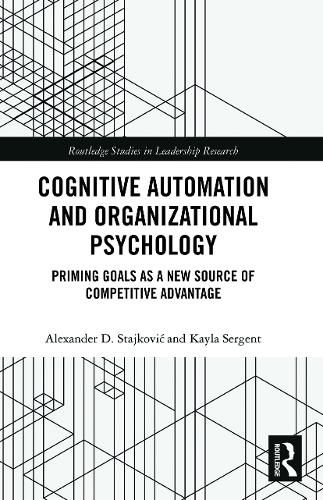Readings Newsletter
Become a Readings Member to make your shopping experience even easier.
Sign in or sign up for free!
You’re not far away from qualifying for FREE standard shipping within Australia
You’ve qualified for FREE standard shipping within Australia
The cart is loading…






Jobs that were once well-defined are now multifaceted. New realities have placed a premium on employee cognitive processing to fulfill complex occupational roles. But human conscious cognitive capacity is limited, making it nearly impossible for employees to keep up without being overloaded. Stajkovic and Sergent refute the common assumption that technological automation is the only way forward. Instead, they directly tackle the issue of employee cognitive overload by proposing cognitive automation as an alternative solution. The authors present a sampling of cutting-edge research showing that conscious guidance is not required for all goal pursuits; goal-directed behavior at work can be automated via priming of subconscious goals.
Building on research in social psychology and organizational behavior, Stajkovic and Sergent introduce four models to explain how subconscious goals are primed in organizations:
*Auto-motive model: Repeated practice with a goal makes cognitive automation possible.
*Goal contagion: Observing and inferring goals of others creates cognitive automation.
*Means-goal priming: Confidence in your goal pursuit enhances cognitive automation.
*A history of reinforcement: Money, feedback, and social recognition used to reinforce goal achievement become associated with the goal, resulting in cognitive automation.
The authors canvas a broad range of knowledge concerning the problem of employee cognitive overload in contemporary organizations and rely on multidisciplinary research to propose cognitive automation as a solution that can address it directly. This book is a deep well of valuable information for those interested in solving real work problems with application of science of organizational behavior (SOB).
$9.00 standard shipping within Australia
FREE standard shipping within Australia for orders over $100.00
Express & International shipping calculated at checkout
Jobs that were once well-defined are now multifaceted. New realities have placed a premium on employee cognitive processing to fulfill complex occupational roles. But human conscious cognitive capacity is limited, making it nearly impossible for employees to keep up without being overloaded. Stajkovic and Sergent refute the common assumption that technological automation is the only way forward. Instead, they directly tackle the issue of employee cognitive overload by proposing cognitive automation as an alternative solution. The authors present a sampling of cutting-edge research showing that conscious guidance is not required for all goal pursuits; goal-directed behavior at work can be automated via priming of subconscious goals.
Building on research in social psychology and organizational behavior, Stajkovic and Sergent introduce four models to explain how subconscious goals are primed in organizations:
*Auto-motive model: Repeated practice with a goal makes cognitive automation possible.
*Goal contagion: Observing and inferring goals of others creates cognitive automation.
*Means-goal priming: Confidence in your goal pursuit enhances cognitive automation.
*A history of reinforcement: Money, feedback, and social recognition used to reinforce goal achievement become associated with the goal, resulting in cognitive automation.
The authors canvas a broad range of knowledge concerning the problem of employee cognitive overload in contemporary organizations and rely on multidisciplinary research to propose cognitive automation as a solution that can address it directly. This book is a deep well of valuable information for those interested in solving real work problems with application of science of organizational behavior (SOB).